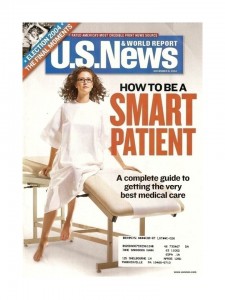 U.S. health consumers continue their self-rationing behavior, forgoing prescription drug fills and doctor’s appointments due to cost. Consumer Reports annual prescription drug poll echoes the news, consistent with other surveys finding Americans skipping necessary care from Kaiser Family Foundation and the American Osteopathic Association. I’ve discussed the trend of health self-rationing identified in these polls in past Health Populi posts, here and here.
U.S. health consumers continue their self-rationing behavior, forgoing prescription drug fills and doctor’s appointments due to cost. Consumer Reports annual prescription drug poll echoes the news, consistent with other surveys finding Americans skipping necessary care from Kaiser Family Foundation and the American Osteopathic Association. I’ve discussed the trend of health self-rationing identified in these polls in past Health Populi posts, here and here.
Since 2011, nearly 1 in 2 health citizens younger than 65 — that is, those people without Medicare which carries the Part D prescription drug benefit — did not fill a prescription due to cost. This proportion grew over 50%, from 27% of U.S. adults under 65 to 45% of under-65s.
Consumer Reports unearthed a communication gap between patients and providers when it comes to talking health finance. 68% of those surveyed said they’re uncomfortable talking about costs with pharmacists, and 47% have difficulty with this conversation with their doctor.
This survey, which sampled only U.S. adults currently taking at least one prescription, found that nearly one-half of respondents take 4 drugs, and 14% take 7 or more.
A new-new finding is that 25% of people 18-39 take two prescription drugs — a major finding because historically, it’s been presumed that taking more than one Rx on a regular basis was the province of seniors. This speaks to the growing chronic disease burden in younger and younger people, such as earlier diagnosis of high blood pressure, diabetes, hypercholesterolemia, and other conditions that, left unchecked, untreated and unmonitored, lead to more complicated diseases, greater disability and higher downstream costs.
Specific self-rationing behaviors were that:
- 62% declined a medical test because of cost (29 percentage points higher than 2011)
- 45% skipped filling a prescription because of cost (19 percentage greater than 2011)
- 63% postponed a visit to the doctor’s office to save money (16 percentage points higher)
- 51% skipped a medical procedure due to cost (12 percentage points greater than 2011).
On average, these consumers spent $63 out-of-pocket per month on Rx drugs. For those people with Rx insurance coverage, their monthly outgo was $91 a month for prescription drugs.
It wouldn’t be CR without recommendations for consumers: they say, use generic drugs where available, split pills “when appropriate,” and substitute OTC drugs where possible.
Consumer Reports conducted a telephone survey among 1,158 U.S. adults 18 and older, who currently take at least one prescription drug, in May and June, 2012.
 Health Populi’s Hot Points: U.S. health citizens are being cast into the role of health consumers whether they/we like it or not. This isn’t just a case of liking the role; when it comes to health, it’s whether we’re prepared to take on the mantle of Consumerista of Health — our own, and the health of those for whom we care.
Health Populi’s Hot Points: U.S. health citizens are being cast into the role of health consumers whether they/we like it or not. This isn’t just a case of liking the role; when it comes to health, it’s whether we’re prepared to take on the mantle of Consumerista of Health — our own, and the health of those for whom we care.
See the US News cover titled, How to be a smart patient. This is my personal issue of the magazine from November, 2004. In these nearly-eight years, have we come very far in Building the Smart Patient?
Not really. With all of the information available to us online, via tethered and mobile platforms, there are still nearly 50% of U.S. health consumers not filling necessary prescriptions. Doing this is short-term “fiscally” smart, but in the long-term, not so “physically” wise.
That’s because tens of thousands of people end up in the ER and urgent care facilities with prescription drug errors, that can be deadly. Furthermore, in the era of increasing accountable care, consumers must be more “accountable” — read “responsible” — for smart self-care. In the world of high-deductible health care and confusion of how to manage an HSA or FSA, consumers need more than simple health literacy — they need health plan literacy, learning how to optimally manage their health in the context of their health plan.
In the worsening economy, a plethora of U.S. health citizens aren’t getting this right. As health care goes more accountable, tasking consumers to play even greater roles in self-care, are we ready to play starring roles in, “Health: You as the Patient?” I think not.




 Thanks to Feedspot for naming this blog, Health Populi, as a
Thanks to Feedspot for naming this blog, Health Populi, as a